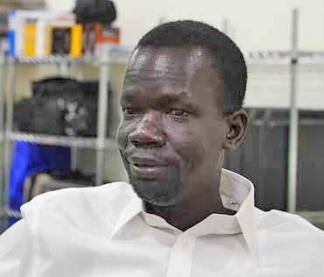news article
How God provided for Lost Boy Majer Kuon
August 2, 2017 / By Shannon Hodson / .(JavaScript must be enabled to view this email address)
Today’s headlines about South Sudan provide a glimpse of the struggles that the Southern Sudanese people face today. Civil war casualties. Famine. Attacks on aid workers.
South Sudan (which was a part of Sudan until 2011) has a long history of struggle.
Colonized by the British in the 1940s, Sudan became independent in 1956. However, conflict immediately grew between the Northern part of Sudan (and the Sudanese government) and the Southern part of Sudan (considered the rebels).The Northern part of Sudan was Muslim. The Southern part of Sudan was not and did not want to follow Islamic rules. This civil war lasted until 1972, which ended with the Addis Ababa Agreement, granting those in Southern Sudan much more autonomy.
A second civil war erupted in 1983 due to this law, for example, children could not be schooled if they were not Muslim).
The Northern Sudanese army was much more powerful than the Southern rebels; they started taking control over the South and inducting many of the rebels to become part of their army. Southern Sudanese civilians were killed daily by Northern planes dropping bombs
In 1987, over 16,000 young boys, between the ages of 7 and 14, fled Southern Sudan by foot to escape death or induction into the Northern Sudan army. Those that survived became known as the Lost Boys.
Majer Kuon, from the Bor area of Southern Sudan, was one of the Lost Boys. These boys walked over 1,000 miles in and out of war zones until they reached Ethiopia 35 days later. Many died of dehydration, exhaustion, and other causes.
Speaking of the dire conditions of the journey, Majer said, “There were times with no water. We would try to eat wild fruit from trees along the road, but you are not thinking of eating…you are thinking not to die; so you just go the direction that you do not hear gunshots. We saw many die and we buried them, and kept going. A lot of boys also drowned in the river crossing because they couldn’t swim.”
The Lost Boys settled in a refugee camp in Pinyidu, Ethiopia, but they were forced to leave in 1991 because the newly elected Ethiopian government was an ally to North Sudan.They threatened using force to kick the Southern Sudanese children out of Ethiopia so the Lost Boys fled once again.
This time, thousands more died—many from starvation. Fleeing gun shots, many jumped in the river and drowned or were attacked by alligators.
Those who survived moved to South Sudan and stayed along the border, continually walking south to Kenya, a journey that lasted from May of 1991 to August of 1992. Along their journey, the Red Cross dropped food from planes and had a truck that came to supply water for the boys.
Once in Kenya, they settled in the Kakuma Camp. The camp, monitored by the United Nations High Commissioner for Refugees (UNHCR) was a blessing that began drastically improving the lives of the Lost Boys. Majer said,“Kakuma became our home for a long time. That’s where we went to school. Here, many organizations affiliated with the UN came to help and supply food for us.”
The Church was very central to the lives of the Lost Boys in Kenya. Majer said, “Sundays could not come soon enough. It is in Kenya where my wisdom about God’s power kicked in. Before coming to Kenya, when I reflected on the journey we took from South Sudan to Ethiopia and then Ethiopia to Kenya, I thought my survival was fate, but in Kenya, I came to realize that there is something bigger that protected so many of us from death. Faith became strong amongst my whole community in Kenya. We trusted in God.”
Because the war waged on in Sudan the UNHCR determined that family unification for the Lost Boys was not a viable option. They contacted the United States Government about relocating some of the boys to the U.S. and the U.S. agreed. The UNHCR recommended around 4,500 of them for resettlement in the United States starting in 2000.
Majer explains the selection process, “The INS (Immigration and Naturalization Services) brought a lawyer and interviewed us. Bit by bit, some of us qualified. There was a board where they would post the names of people who were going. I saw my name there in December of 2000, learning that I would be going to the United States in 2001.”
After several flights, Majer arrived in Syracuse, NY. A group of Methodist churches helped make his arrangements and stay comfortable. He said “I was filled with excitement! After all I went through; here I was in an apartment where I could have light 24/7. And I was crazy about education; I earned a Bachelor’s Degree at Binghamton University.”
Majer said, “The Christians here care about people that they don’t even know; they do it without anyone even asking. They do it because of their faith; because they trust that God is enough.”
Editor’s Note: Major returned to Sudan in 2007, during a time when there was peace, to help his father who had fallen sick. While Majer was back in South Sudan, he connected with Upper New York United Methodists to help form the Southern Sudan Health Project, Majer Kuon’s father passed away in 2016. Civil war between tribes in South Sudan also began in 2013; thousands have been killed. Majer is now back in Syracuse for medical treatment for arthritis.